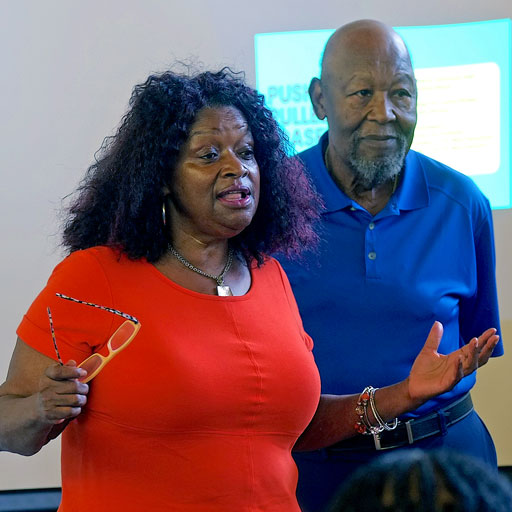By Mia Khatib
mia.khatib@triangletribune.com
RALEIGH — In the late 20th century, urban renewal wiped out many of Raleigh’s predominantly Black communities. While Smoky Hollow’s history has been preserved, the 4th Ward’s was erased, and community activists like Octavia Rainey are working to change this.
Rainey hosted a panel discussion last weekend with former 4th Ward residents and leaders, educating Raleighites on forgotten history and engaging them in how to honor the neighborhood’s legacy. She said the community, which had the highest voting precinct with 3,200 people, and housed 44 Black businesses, was split in half and redeveloped into what is now Southside.
“Fourth Ward should never be forgotten… and we’re going to make that happen,” she said. “We want signage in 4th Ward, we want an oral history project, we want artwork, and, most of all, we want some affordable housing based upon 30% of your ability to pay.”
An attendee asked how they can do this in a way that doesn’t enable the City Council to continue allowing the redevelopment and erasure of Black communities for just a plaque in its stead. Rainey said one of the biggest problems in Southeast Raleigh is that they aren’t branding.
“If we’re branding it now, we don’t have to worry about the city coming through and taking it away,” she said. “I believe that if we can take correct steps, the correct action for 4th Ward, then we can move forward and begin to look at the branding of the other [gentrified] neighborhoods.”
Rainey, council member Jane Anderson and others plan to visit Black churches in the area and bring a strategy together. An audience member, who works at several local universities, said Black people are not monolithic and encouraged them to engage other faith communities, as well as create a curriculum for students beyond 4th Ward to leverage.
Council member Mary Black also chimed in, saying they should engage narrative and multimedia storytelling to reach young people as well. “Tying the history of what has happened to realities to what are happening now and then what is going to happen in the future will make that story better,” she said.
For resident Clara Meeks, 4th Ward was truly a village growing up. She said it’s not true what people say about it being terrible. There were previous efforts to organize in the neighborhood, but elders have since passed or given up “because it seemed like nobody really wanted to help do anything.”
“You have to understand that it goes back to first being written off as crime-ridden neighborhoods [by the police department], all the Black neighborhoods,” Rainey said. “They put all this under urban renewal.”
Other audience members questioned how to prevent further demolition and gentrification of Black neighborhoods. Rainey said a new stage of urban renewal is coming to Southeast Raleigh now that the City has purchased the state’s old DMV headquarters and “we must be prepared to fight those battles.”
Bill Riddick, leader of the 4th Ward charrette, emphasized the power of “louder leadership” and said the community needs to unite to identify the problem, create a strategy for how to deal with it and then take action to invoke change.
“We also need some information of what is in store for the community right now from the City of Raleigh,” he said. “That has to occur because they hold the hand with the money, and we don’t.”
Mia Khatib, who covers affordable housing and gentrification, is a Report for America corps member.

